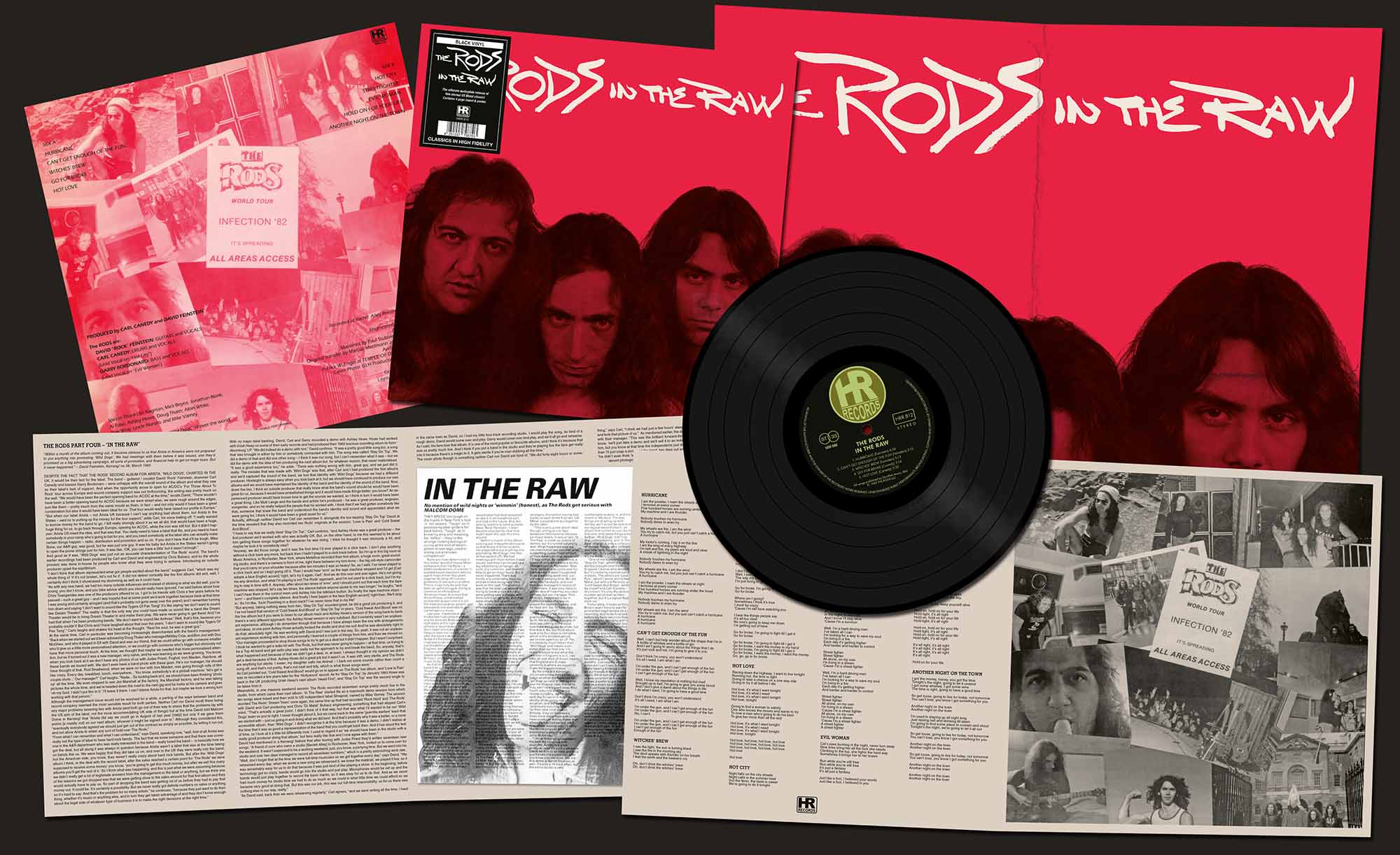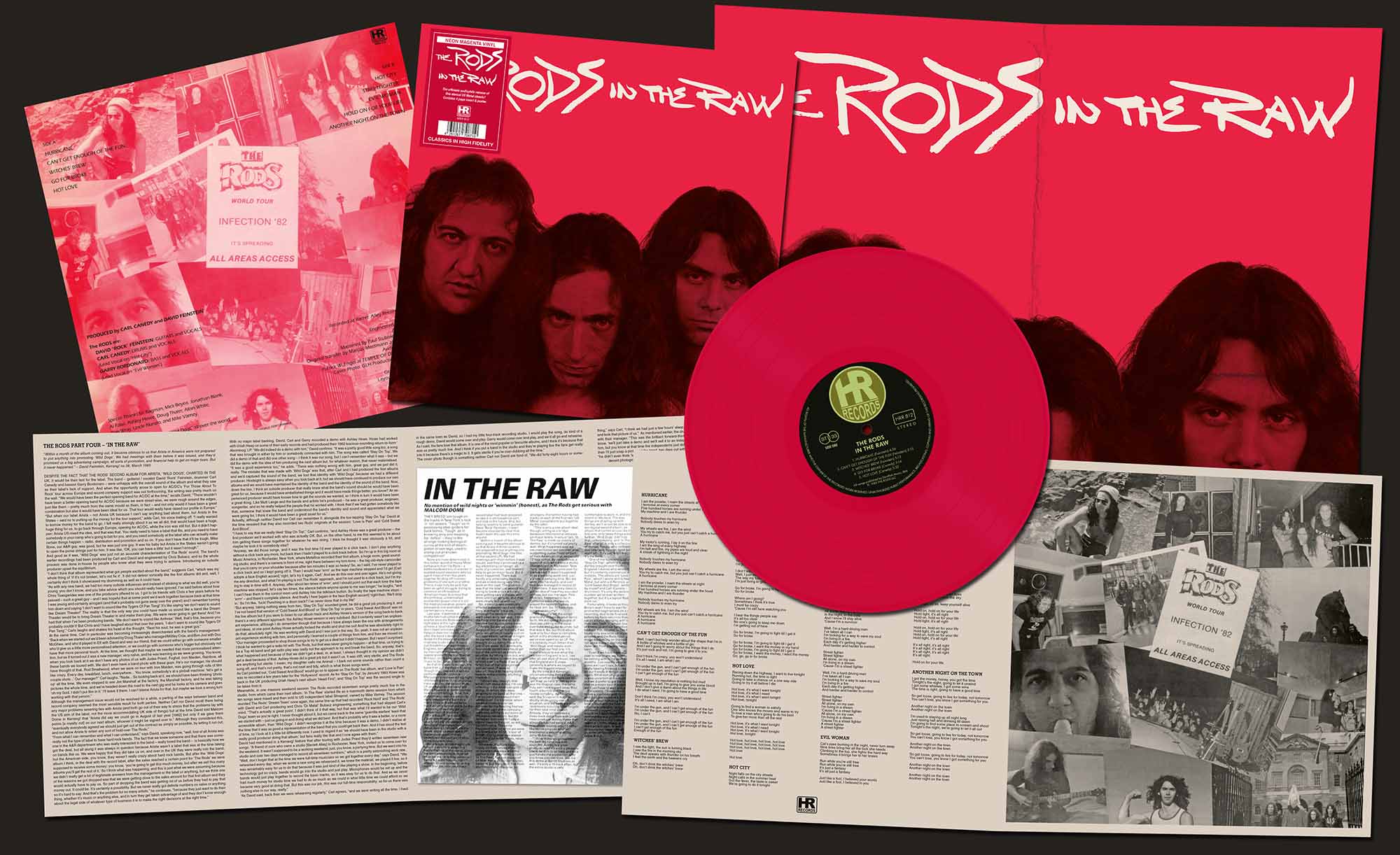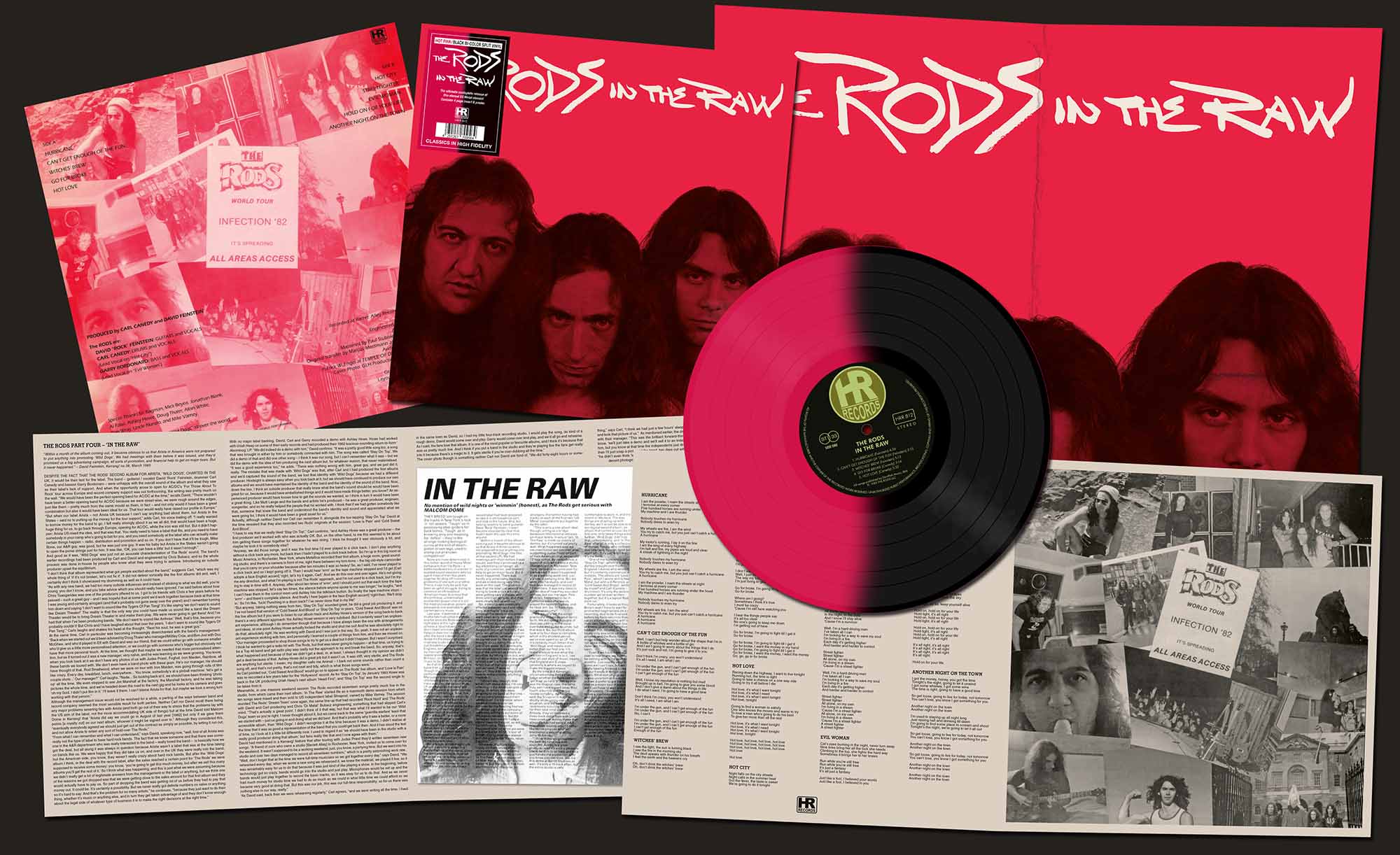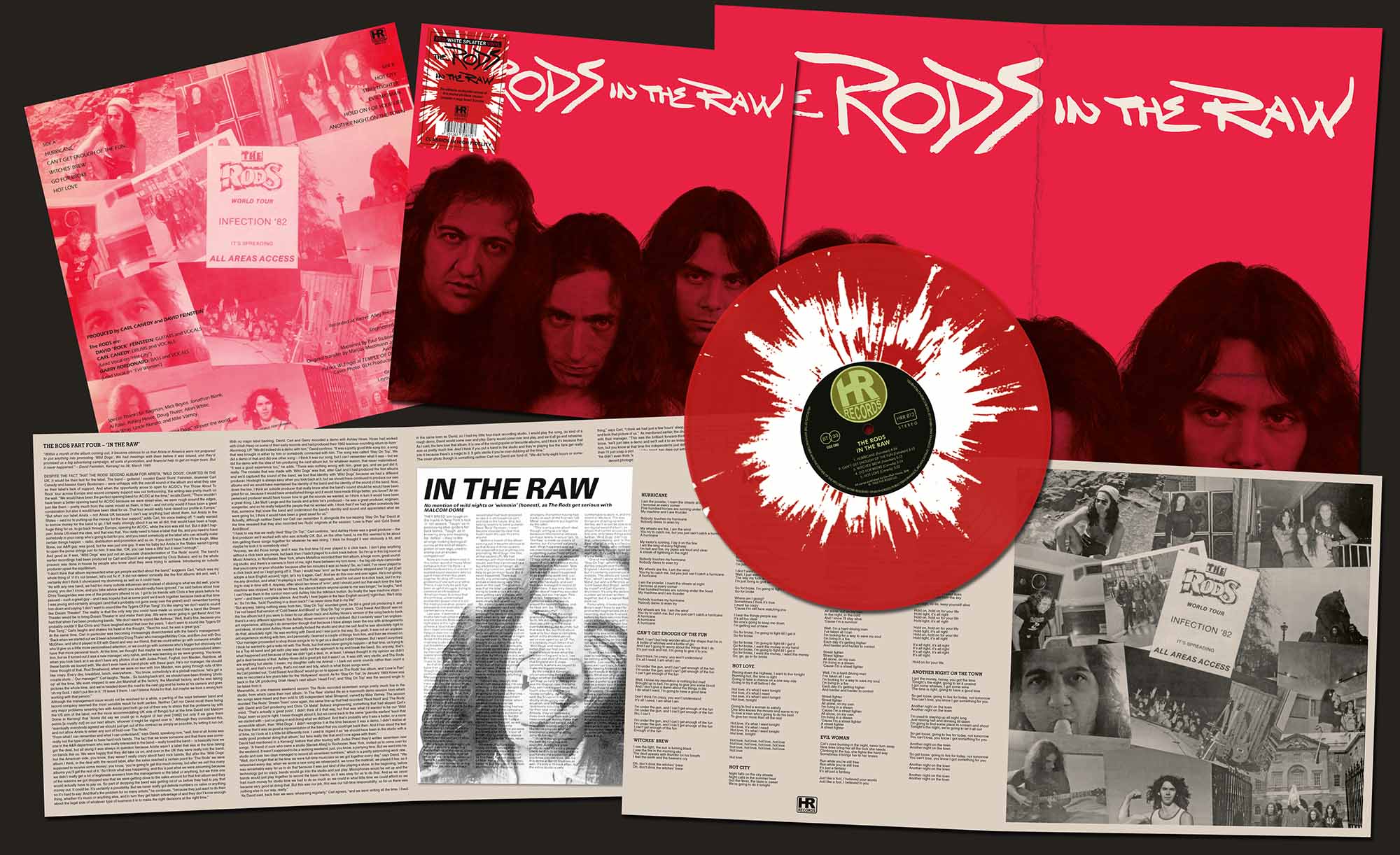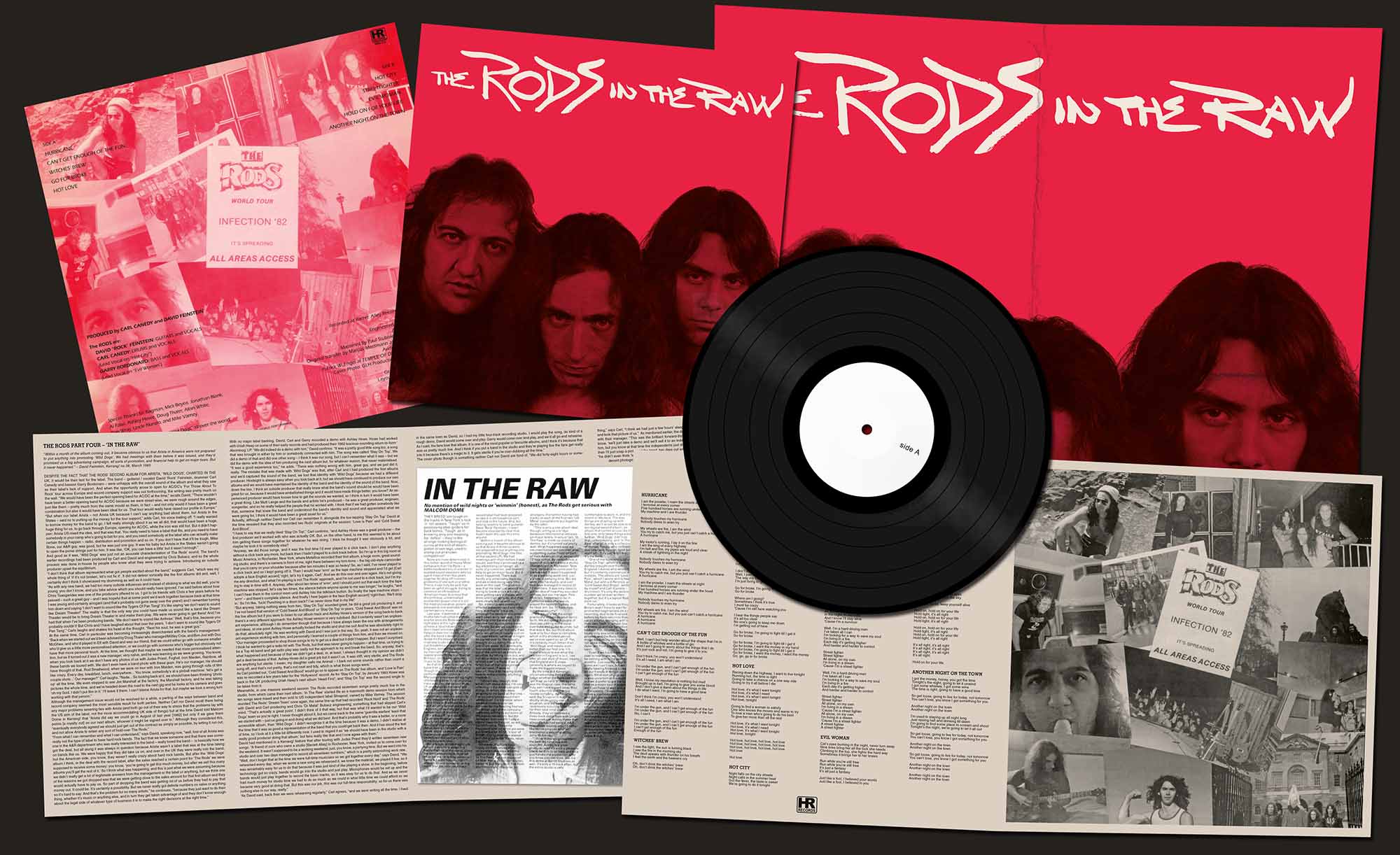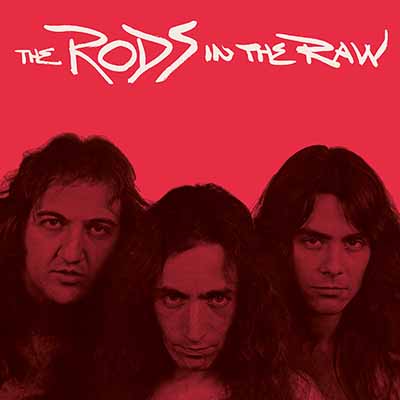 | ||||
| THE RODS - In the Raw LP | |
HRR 812LP, ltd 750, 250 x black, 200 x neon magenta, 200 x hot pink magenta/ black bi-color split + 100 x red/ white splatter vinyl (HRR mailorder exclusive), 425gsm heavy cardboard cover, 4 page insert printed on uncoated paper, poster | |
| David “Rock” Feinstein - Guitar & Vocals Garry Bordonaro - Bass & Vocals (Lead Vocals on “Evil Woman”) Carl Canedy - Drums & Vocals (Lead Vocals on “Hot City”) | |
| 01 Hurricane 02 Can't Get Enough of the Fun 03 Witch's Brew 04 Go for Broke 05 Hot Love 06 Hot City 07 Street Fighter 08 Evil Woman 09 Hold on for Your Life 10 Another Night on the Town | |
AVAILABLE | |
Original transfer by Marcus Mossmann at PHONOGRAPHIC ARTIFACTS. Audio restoration and mastering by Patrick W. Engel at TEMPLE OF DISHARMONY in November 2020. Cutting by SST Germany on Neumann machines for optimal quality on all levels...
The ultimate audiophile reissue of this eternal US Metal classic!
“Within a month of the album coming out, it became obvious to us that Arista in America were not prepared to put anything into promoting ‘Wild Dogs’. We had meetings with them before it was issued, and they’d promised us a big advertising campaign, all sorts of promotion, and financial help to get on major tours. But it never happened.” – David Feinstein, Kerrang! no.38, March 1983
DESPITE THE FACT THAT THE RODS’ SECOND ALBUM FOR ARISTA, ‘WILD DOGS’, CHARTED IN THE UK, it would be their last for the label. The band – guitarist / vocalist David ‘Rock’ Feinstein, drummer Carl Canedy and bassist Garry Bordonaro – were unhappy with the overall sound of the album and what they saw as their label’s lack of support. And when the opportunity arose to open for AC/DC’s ‘For Those About To Rock’ tour across Europe and record company support was not forthcoming, the writing was pretty much on the wall. “We would have been the perfect opening band for AC/DC at the time,” recalls David. “There wouldn’t have been a better opening band for AC/DC because we were street-wise, we were rough around the edges, just like them – pretty much from the same mould as them, in fact – and not only would it have been a great combination but also it would have been ideal for us. That tour would really have raised our profile in Europe.”
“But when our label Arista – not Arista UK because I can’t say anything bad about them, but Arista in the States – said no to putting up the money for the tour support,” adds Carl, his voice trailing off. “I really wanted to borrow money for the band to go, I felt really strongly about it as we all did; that would have been a huge, huge thing for us, to go back through Europe, opening for AC/DC, while the iron was still hot. But it didn’t happen: Arista US nixed the idea, and that was that. You really need to have a label that fits, and you need to have somebody in your camp who’s going to bat for you, and you need somebody at the label who can actually make certain things happen – radio, distribution and promotion and so on. If you don’t have that it’ll be tough. Mike Bone, our A&R guy, was good, but he was just one guy. It was his baby but Arista in the States weren’t going to open the purse strings just for him. It was like, ‘OK, you can have a little’ but it wasn’t enough.”
And good as it was, ‘Wild Dogs’ was just not an accurate characterisation of The Rods’ sound. The band’s earlier recordings had been produced by Carl and David and engineered by Chris Bubacz, and so the whole process was done in-house by people who knew what they were trying to achieve. Introducing an outside producer upset the equilibrium.
“I don’t think that album represented what got people excited about the band,” suggests Carl, “which was my whole thing of ‘if it’s not broken, let’s not fix it’. It did not deliver sonically like the first albums did and, well, I certainly don’t think it showcased my drumming as well as it could have.
“As with any new band, we had too many outside influences and instead of sticking to what we did well, you’re young, you don’t know, and you take advice which you should really have ignored. I’ve said before about how Chris Tsangarides was one of the producers offered to us. I got to be friends with Chris a few years before he passed – such a great guy – and I was hopeful that at some point we’d work together because back at that time I was young and certainly arrogant (and that’s probably not gone away over the years!) and I remember turning him down and saying ‘I don’t want to sound like the Tygers Of Pan Tang!’ It’s like saying ‘we don’t want to sound like Dream Theater!’ The reality is that the only way you could have made us sound like a band like Dream Theater would be to bring Dream Theater in and make them play. We were never going to get there! And I’ve had that when I’ve been producing bands. ‘We don’t want to sound like Anthrax.’ Well, that’s fine, because you probably couldn’t! But Chris and I have laughed about that over the years. ‘I don’t want to sound like Tygers Of Pan Tang’,” Carls laughs and shakes his head at the thought. “Rest his soul, he was a great guy.”
At the same time, Carl in particular was becoming increasingly disenchanted with the band’s management. “Back when we started out we’d been advised by Doug Thaler who managed Mötley Crüe, and Bon Jovi with Doc McGhee, and who’d played in Elf with David and was our friend, that we could either go with someone smaller who’d give us a little more personalised attention, or we could go with someone who’s bigger but obviously not have that more personal touch. At the time, we thought that maybe we needed that more personalised attention, but as it turned out it was a new manager, very naïve, and he was learning as we were growing. You know, when you look back at it we don’t have any photos of us with Judas Priest, Foghat, Iron Maiden, Rainbow, all these bands we toured with. We don’t even have a band photo with these guys. He’s our manager. He should have thought of that. Rod Smallwood, when we were on tour with Iron Maiden, was going through rolls of film like crazy. Every day, breakfast, lunch, everywhere... You know, somebody’s at a pinball machine: ‘let’s get a couple shots...’ Our manager?” Carl laughs. “Nada... So looking back at it, we should have been thinking ‘photo op’ all the time. We even stopped to see Jim Marshall at the factory, the Marshall factory, and he was taking pictures the whole time, and we’re headed down the road to the next gig and he looks at his camera and goes ‘oh my God, I didn’t put film in it.’ I’ll leave it there. I can’t blame Arista for that, but maybe we took a wrong turn working with that person.”
Although the management issue would not be resolved for a while, a parting of the ways between band and record company seemed the most sensible result for both parties. Neither Carl nor David recall there being any major problems severing ties with Arista (and both go out of their way to stress that the problems lay with the US arm of the label, not the more accommodating UK side of things) but at the time David told Malcom Dome in Kerrang! that “Arista did say we could go in August of last year [1982"> but only if we gave them points [a royalty cut"> on our next album, whoever it might be signed over to.” Although they considered this, “eventually everybody agreed we should just get out of the contract as simply as possible, by letting it run out, and not allow Arista to retain any sort of hold over The Rods.”
“From what I can remember and what I can understand,” says David, speaking now, “well, first of all Arista was really not the type of label to have hard rock bands. The fact that we knew someone and that there was someone in the A&R department who was really interested in the band – really loved the band – is basically how we got the deal, but all along it was always in question because Arista wasn’t a label that was at the time taking on bands like us. We were happy that they did take us on, and over in the UK they were really into the band, but the American side, you know, they weren’t really crazy about hard rock bands. But after the ‘Wild Dogs’ album I think, in the deal with the record label, after the sales reached a certain point for ‘The Rods’ we were supposed to receive some money: you know, ‘you’re going to get this much money, but after we sell this many albums you’ll get the rest of it.’ So I think what was happening, and this is just what we were assuming because we didn’t really get a lot of legitimate answers from the management or the label or anything, but we think one of the reasons we got dropped was that we were getting close to the sales amount for that first album and they would actually have to pay us. So part of dropping the band was getting rid of us before they had to pay that money out. It could be. It’s certainly a possibility. But we never really got definite numbers on sales or anything so it’s hard to say. And that’s the problem for so many artists,” he continues, “because they just want to do their thing, whether it’s music or anything else, and in turn they get taken advantage of and they don’t know enough about the legal side of whatever type of business it is to make the right decisions at the right time.”
With no major label backing, David, Carl and Garry recorded a demo with Ashley Howe. Howe had worked with Uriah Heep on some of their early records and had produced their 1982 luscious-sounding return-to-form ‘Abominog’ LP. “We did indeed do a demo with him,” David confirms. “It was a pretty good little song too, a song that was brought in either by him or somebody connected with him. The song was called ‘Stay On Top’. We did a demo of that and did one other song – I think it was our song, but I can’t remember what it was – but we did the demo with the idea of him producing the next album but, for whatever reason, that never materialised.
“It was a good experience too,” he adds. “There was nothing wrong with him, great guy, and we just did it, really. The mistake that was made with ‘Wild Dogs’ was that, after Carl and I had produced the first albums and we’d captured the sound of the band, we lost that identity with ‘Wild Dogs’ because we had a different producer. Hindsight is always easy when you look back at it, but we should have continued to produce our own albums and we would have maintained the identity of the band and the identity of the sound of the band. Now, down the line, I think an outside producer that really knew what the band’s sound should be would have been great for us, because it would have embellished things and it would have made things better, you know? An experienced producer would have known how to get the sounds we wanted, so I think in turn it would have been a great thing. Like Mutt Lange and the bands and artists he’s produced – he was a great producer, engineer, songwriter, and so he really helped the people that he worked with. I think that if we had gotten somebody like that, someone that knew the band and understood the band’s identity and sound and appreciated what we were going for, I think it would have been a great asset for us.”
Actually, although neither David nor Carl can remember it, alongside the toe-tapping ‘Stay On Top’ David at the time revealed that they also recorded two Rods’ originals at the session: ‘Love Is Pain’ and ‘Cold Sweat And Blood’.
“I have to say that we really liked ‘Stay On Top’,” Carl confirms, “and Ashley Howe was a great producer – the first producer we’d worked with who was actually OK. But, on the other hand, to me this seemed to be about him getting these songs together for whatever he was doing. I think he thought it was obviously a hit, and maybe he took it to somebody else?
“Anyway, we did those songs, and it was the first time I’d ever played to a click track, I don’t play anything without a click track any more, but back then I hadn’t played to a click track before. So I’m up in this big room at Music America, in Rochester, New York, where Metallica recorded their first album, a huge room, great sounding studio; and there’s a camera in front of me, right there between my tom-toms – the big old-style camcorder that you’d carry on your shoulder because after ten minutes it was so heavy! So, as I said, I’ve never played to a click track and so I kept going off it. Then I would hear ‘errrr’ as the tape machine stopped and I’d get [Carl adopts a faux-English accent"> ‘right, let’s try it again, Carl.’ And we do this over and over again. He’s not giving me any direction, and what I’m playing is not The Rods’ approach, and I’m not used to a click track, but I’m trying to stay in time with it. Anyway, after about ten times of ‘errrr’, and I should point out that each time the tape machine was stopped, let’s say ten times, the silence before anyone spoke to me was longer,” he laughs, “and I can’t hear them in the control room until Ashley hits the talkback button. So finally the tape machine stops – ‘errrr’ – and there’s complete silence. And finally I hear [again in the faux-English accent"> ‘right then. We’ll drop in.’ So I’m like, ‘fuck! Punching in a drum track? I’ve never done that in my life!’
“But anyway, taking nothing away from him, ‘Stay On Top’ sounded great, he did a great job producing it, and I’ve not heard that version of ‘Cold Sweat And Blood’ or ‘Stay On Top’ in years. ‘Cold Sweat And Blood’ was on the live album but if you were to listen to our album track and Ashley Howe’s version of the song back-to-back there’s a very different approach: the Ashley Howe version is very subdued. But it certainly wasn’t an unpleasant experience, although I do remember though that because I have always been the one with arrangements and ideas, at one point Ashley Howe actually locked the studio and shut me out! And he was absolutely right to do that; absolutely right. He was working with David and I was just in the way. So, yeah, it was not an unpleasant experience working with him, and personally I learned a couple of things from him, and then we moved on.
“Our manager proceeded to shop those songs to try to get us a deal but it didn’t happen. But I wasn’t surprised. I think he wanted to get a radio hit with The Rods, but that was never going to happen – at that time, us trying to be a Top 40 band and get radio play was really not the approach to try and break the band. So, anyway, that’s what happened and because of that we didn’t get a deal, or, at least, I always thought in my opinion we didn’t get a deal because of that. Ashley Howe did a great job but it wasn’t us. It was stiff, very sterile, and The Rods are anything but sterile. I mean, my daughter calls me Animal – I bark out some sounds rather than count a song off, and that’s not pretty, that’s not neat and tidy, which is what those songs were.”
As Carl pointed out, ‘Cold Sweat And Blood’ would go on to appear on The Rods’ live album, and ‘Love Is Pain’ was re-recorded a few years later for the ‘Hollywood’ record. As for ‘Stay On Top’, by January 1983 Howe was back in the UK producing Uriah Heep’s next album ‘Head First’; and ‘Stay On Top’ was the second single to be taken from it.
Meanwhile, in one massive weekend session The Rods recorded seventeen songs pretty much live in the studio, from which came their next album. ‘In The Raw’ started life as a mammoth demo session from which ten songs were mixed and then sold to US independent label Shrapnel, owned by Mike Varney. The session reunited The Rods’ ‘Dream Team’ once again, the same line-up that had recorded ‘Rock Hard’ and ‘The Rods’ with David and Carl producing and Chris ‘Dr Metal’ Bubacz engineering, something that had slipped Carl’s mind. “That’s actually a great point. I didn’t think of it that way, but that was what I’d wanted to be our ‘Wild Dogs’ team so you’re right. I never thought about it, but we came back to the same ‘guerrilla warfare’ team that we started with – just us going in and doing what we did best. And that’s probably why it was a better, or a more accessible album, than ‘Wild Dogs’. I didn’t recognise it at the time because it was a demo, I didn’t realise at the time that it was as good a representation of the band that you could get back then. And it has stood the test of time, so I look at it a little bit differently now. I used to regard it as ‘we should have been in the studio with a really good producer doing that album,’ but fans really like that and I now agree with them.”
David had mentioned in a Kerrang! feature that after touring with Judas Priest they’d written seventeen new songs. “A friend of ours who owns a studio [Barrett Alley"> in Rochester, New York, invited us to come over for the weekend. It wasn’t supposed to be a working weekend, just, you know, a partying time. But we went into his studio and over two days managed to record all seventeen numbers,” which is a pretty astonishing work rate.
“Well, don’t forget that at the time we were full-time musicians so we got together every day,” says David. “We rehearsed every day; when we wrote a new song we rehearsed it, we knew the material, we played it live, so it was remarkably easy for us to do that because it was just kind of like playing a show. In the beginning, before technology got so crazy, bands would go into the studio and just play. Microphones would be set up and the bands would just play together to record the basic tracks, so it was easy for us to do that. And as we never had much money for studio time we had to do as much as we could in what little time we could afford so we became very good at doing that. But this was our job, this was our full-time responsibility, so for us there was nothing else in our way, really.”
“As David said, back then we were rehearsing regularly,” Carl agrees, “and we were writing all the time. I lived in the same town as David, so I had my little four-track recording studio. I would play the song, do kind of a rough demo, David would come over and play, Garry would come over and play, and we’d all go and rehearse. As I said, the fans love that album. It is one of the most popular or favourite albums, and I think it’s because that was us pretty much live. And I think if you put a band in the studio and they’re playing live the fans get really into it because there’s a magic to it. It gets sterile if you’re over-dubbing all the time.”
The cover photo though is something neither Carl nor David are fond of. “We did forty-eight hours or something,” says Carl, “I think we had just a few hours’ sleep, and then our manager came in as we were mixing it and took that picture of us.” As mentioned earlier, the drummer had already pretty much lost faith and patience with their manager. “This was the brilliant forward-thinking that was happening with our management. You know, ‘we’ll just take a demo and we’ll sell it to an independent label’ – and I like Mike Varney; no shame on him, but you know at that time the independents just didn’t have the distribution – ‘for not a ton of money and then I’ll just snap a picture of the band, two days out with no sleep, and that’ll be the cover.’ Wow!,” says Carl, “he didn’t even think ‘let them get a couple of hours’ sleep and then let’s spend fifty bucks and actually get a decent photograph..”
It certainly isn’t the band’s best album cover.
“No, but it’s the cheapest!” quips David.
As Carl pointed out, the independent labels at that time had limited distribution, which meant that anyone buying ‘In The Raw’ outside of the States had to pay hefty import prices. The deal with Shrapnel was just one a one-off though, designed to keep things ticking over, and on its release in March 1983 the album itself was well-received in the British music press.
“If Ratt lie at one end of the HM scale with their polished performance, The Rods are the other extreme, providing a warts ‘n’ all barrage of noise and mayhem. They have never been a band to worry about appearances, but this matters little once the riffs start searing and the beat starts burning,” wrote Dave Roberts in his four-star review in Sounds. “Representing the pie and chips section of mettallica, The Rods always win my vote for their enthusiasm and their commitment... Musically, they utilise the classic three-piece line-up to crash the listener over the head time and time again. It’s not exactly Rush (thank God!) but it hits hard where it hurts most. ‘Hurricane’ and ‘Hot City’ blast off like an Apollo space rocket, while ‘Witches Brew’ imitates the Sabbath-like dirge to perfection. The Rods are not a band for the squeamish; just turn it loud and watch the heads fly.”
Writing in Kerrang!, Malcolm Dome referred to ‘In The Raw’ as “...the album that should right the impotent wrong perpetrated by the limp sibling ‘Wild Dogs’... For the most part, ‘In The Raw’ has a startling line in bulging rifferama. ‘Hurricane’, ‘Can’t Get Enough Of The Fun’, ‘Streetfighter’ and ‘Hold On For Your Life’ are typical over-amped Rods savagery , in that all four numbers balance pounding rhythms with astonishingly classy melodies...” As for ‘Hold On For Your Life’, the reviewer noted the song featured “a devastating tremolo-topped solo from ‘Rock’ Feinstein and a muscular hook I defy anyone not to find irresistible...”
“You know, I can’t even remember the recordings now,” David confesses, “but it was basically the old-school way of recording – set a mic up, play the songs, there were no click tracks, you overdub the vocals, and you overdub the leads, but really it was about as basic as you can get. And I think that nowadays, from people that I’ve been talking to, some of these younger bands want to go back to that whole system again of actually playing the songs – and I’m sure there’s a lot of bands who are already doing it and have been doing it – so instead of putting a click track down and doing the drums, and doing each instrument and making everything as precise as you can possibly make it, there’s a certain thing about the idea of three or four or more musicians just playing the song together. We counted off the song and we played it. And if we got a good take, we kept it. If we got a lousy take, we’d do it again. There’s just something about the feel of people playing together and getting the human-ness back – yeah, it’s going to slow down a little bit, it’s going to speed up a little bit, but that’s just human. When you listen to the early Led Zeppelin records it’s all done that way. And when I listen to when they started to remaster the old stuff of, say, Zeppelin, digitally, and things like that, everything got cleaned up; too much, for my ears. I like hearing it the old way, the old analogue way. It sounded more real to me. And that’s the way the ‘In The Raw’ album was basically done: it was, literally, in the raw.”
With ‘In The Raw’ in the shops, in the US at least, The Rods did what they did best. They went back on the road.
John Tucker February 2021
